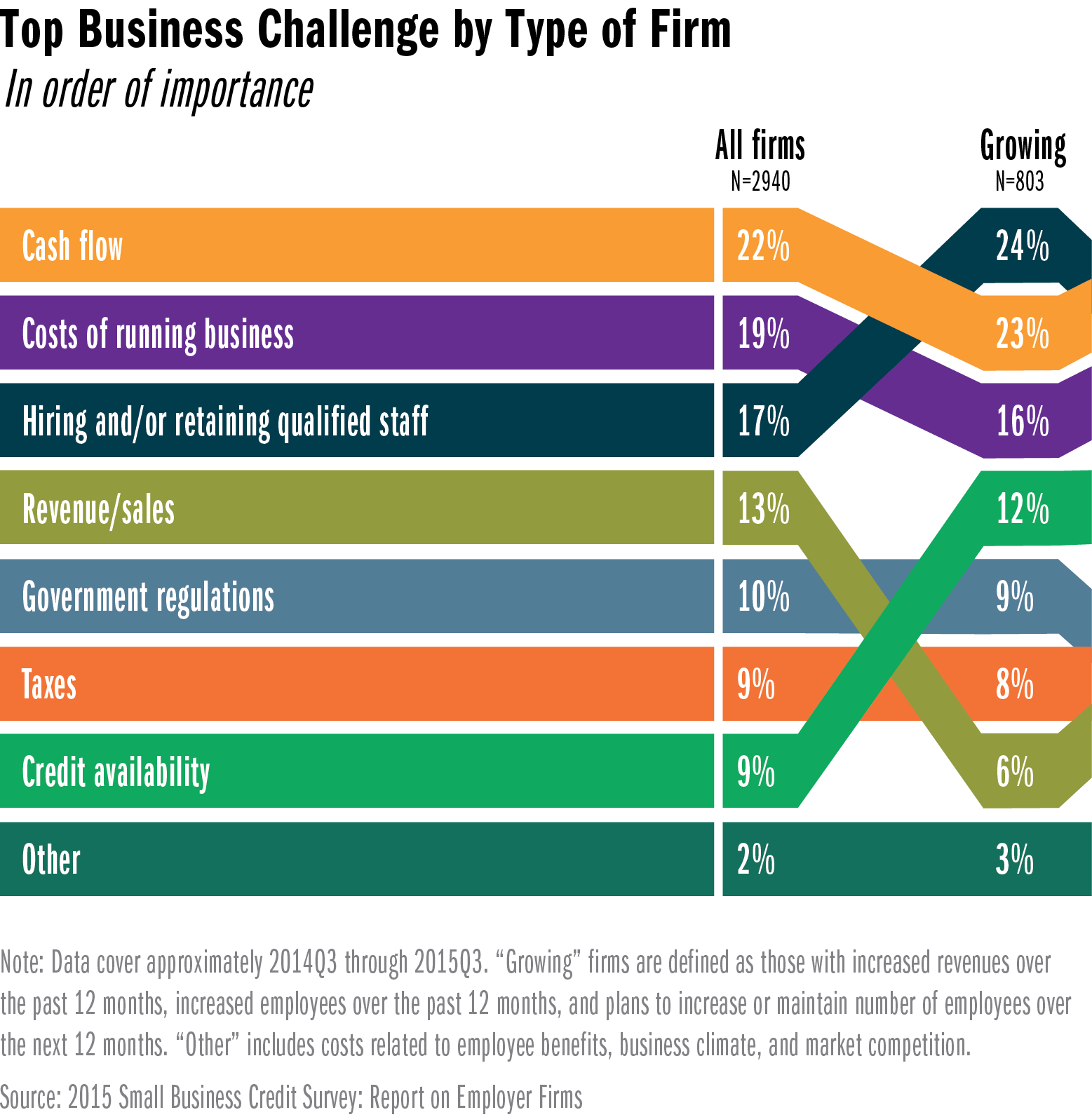By their nature, gazelles grow rapidly, which makes hiring employees—the right employees—an important concern. The fifth and final part of the Gazelle Project examines this aspect of fast-growing small businesses.

Founders of growing businesses have plenty of problems to tackle. Finding talent tops the list.
In fact, hiring and retaining employees is the top challenge facing growing small firms, according to the Joint Small Business Credit Survey Report by the Federal Reserve Banks of Atlanta, Boston, Cleveland, New York, Philadelphia, Richmond, and St. Louis. In contrast, hiring and/or retaining staff was the third most cited concern among all employer firms in the survey.

Fast-growing young companies—gazelles—in the Atlanta Fed's study expressed a similar sentiment when it came to hiring: it's tough to find and keep talented people you like being around.
Editor's note: This article is the fifth in a series of articles that explores the findings of the Atlanta Fed's Gazelle Project.
About the Gazelle Project
The Gazelle Project collected qualitative data in a series of face-to-face interviews with southeastern entrepreneurs who started their businesses within the past 13 years. The project was spearheaded by the Atlanta Fed's John Robertson and Ellyn Terry. This series of articles will summarize the results of the project. Articles will examine a decline in business formations to set the context; firm founders' motivations and experience; the role of social capital, including social and professional relationships, in building gazelles; and the financing of gazelles.
The Atlanta Fed's Regional Economic Information Network (REIN) staff interviewed dozens of entrepreneurs across the Southeast to gather information about three broad areas:
- Human capital: The skills, knowledge, and experience of the individuals involved in launching and building the businesses.
- Social capital: The network of social and professional relationships that the founders use to identify and access resources.
- Financial capital: The financing the founders used to begin operations and to fund growth.
The Atlanta Fed's interest in small business focuses on three related issues: the role of small business in job creation; the role of small business in local economic development, and the role of the banking system in small business financing.
Traditional methods of finding employees when a company is unknown and has no human resources department can be especially difficult. So with traditional avenues foreclosed, many of the firms examined in the Gazelle Project relied on references from personal and business acquaintances to fill out their ranks quickly with quality personnel. These company founders called on coworkers or customers from previous jobs, college alumni connections, military buddies, and even competitors.
Grow your own
Take Scott Green, for example. Green isn't looking to hire friends. But he does seek people he likes, people who'll mesh with his current staff and who possess a strong work ethic. The founder of Creative Concepts Inc., a candy wholesaler and gazelle in Birmingham, Green once asked a friend who's a sales manager for a big food company how he goes about hiring.
 Scott Green
Scott GreenThe most impressive resume and experience, the friend advised, are not always decisive. After all, you can train someone to do what you need. That advice "really helped me," said Green, "and it agreed with what we were doing. We're looking for people who match the business and the culture."
Green's approach to finding and retaining people is one philosophy among several voiced by firm founders studied in the Gazelle Project.
For example, a finance company in the project would identify individuals with a strong work ethic but no relevant experience and then train them. This way, employees were all groomed with the same mindset, making it easier to learn the companies' unique ways of doing business.
Hannah Paramore, who runs a digital marketing agency in Nashville, adopted an organic approach to hiring and development partly out of necessity, she said.
She's had little success importing hotshots from larger cities like New York and Chicago. They chafed at salaries lower than those for similar jobs in their former homes, and in some cases they displayed an arrogance that annoyed coworkers. Those imported stars generally didn't stay with the firm more than a couple years, Paramore said.
"We do much better when we grow our own," she declared.
Still, it's gotten more difficult to find talent, according to Paramore. But having been around for 14 years, the firm's good work attracts people. In turn, good people tend to draw other good people. "Our employees find their coworkers," Paramore said.
 Hannah Paramore
Hannah ParamoreLook abroad
Such networks within industries were critical for many gazelles. Yet when networks weren't broad enough, gazelles extended their search. In a few cases, gazelle founders reported scouring job boards worldwide, or even strategically locating offices in particular corners of the globe. Sometimes looking abroad offered a larger pool of quality talent, or it allowed them to keep labor costs down.
For instance, to save money and training time, an Internet marketing firm in the Gazelle Project outsourced web development to India. However, in 2011 the firm brought the work back to the United States because of inefficiencies related to language barriers and physical distance. To produce content, the same firm hires, on an hourly basis, college students and work-at-home mothers.
Another technology services firm located a large office staffed with skilled workers close to Cancun. It's an attractive destination for U.S. clients and at the same time distant from the higher-wage district of Mexico City.
Play to your strengths
Some gazelle founders seek to intrigue and thus retain talent by creating an entrepreneurial culture within their company. For example, Alex Hernandez allows certain employees of Hernandez Consulting, his New Orleans–based construction services firm, to run projects, essentially managing their own small profit-and-loss centers. Incentives encourage those managers to maximize the quality and profitability of their projects.
"It's almost like they're running their own little business," said Hernandez, a former Marine whose 40-person staff includes about a dozen veterans.
Crafting creative ways to intrigue employees is often critical for smaller firms like Hernandez Consulting. Hernandez said that amid the energy boom in Louisiana and the resurgence of construction in south Florida—the sites of his firm's two largest offices—competition for engineers intensified as large companies bid up salaries. Unable to compete strictly on pay, Hernandez had to play to his strengths as a smaller business and give his people wider authority than they'd likely have at a large energy or construction concern.
Sometimes it's hard to relinquish control
Hiring professional staff like engineers is one thing. But for many founders, a real crucible comes with the decision of when or whether to hand executive power to someone else. Some gazelle founders observed that entrepreneurs sometimes fail because they resist hiring people who are better at something than they are. A related problem, one founder said, is an unwillingness to relinquish the work.
David Miller and his brother, Michael, knew they needed high-level help when they decided to try to turbocharge the growth of their company, Brightway Insurance of Jacksonville.
The Millers instituted a franchising model, like a fast-food chain. To launch the strategy, the Millers first hired several seasoned executives from larger companies such as H&R Block. Many entrepreneurs, in the view of David Miller, mistakenly think their business is "all about them. And if it's all about them, the business can never achieve its potential," he said. "We thought of our business as our child; you want your kid to be better than you."
 Mark Molinari
Mark MolinariMark Molinari and his business partner, Rick McKay, had little trouble handing over the CEO's job at their firm, 4th Source, a technology services provider. Molinari said "a groundedness" earned over many years and many setbacks freed him from the perils of egotism.
Thus, bringing in an experienced executive to guide 4th Source into a new phase was no problem. It helped, of course, that Molinari and McKay knew the new executive, Michael Wedge, quite well, having worked for him at Oracle, the big software maker, and they both liked and respected him.
Indeed, one advantage to running a gazelle or any small firm is that the founders get to choose the people with whom they will spend a great deal of time. For them, finding competent people whom they also like is business nirvana.
It doesn't always happen that way, of course. But most gazelle founders said they would prefer at least some of both: likeability and talent—with an emphasis on the talent. And many of the entrepreneurs agreed that it's easier to find talent among people they know or through recommendations from people they know. But surmounting the challenge of acquiring talent is always worth the effort. A gazelle's survival depends on it.





